Vanguard's 6 shocking charts about retirement
Retirement is supposed to be a time of freedom, yet Vanguard’s new How Australia Retires 2025 report shows most of us are either underprepared, overconfident in the wrong areas, or weighed down by debt.
The survey of more than 1,800 Australians is full of charts that reveal just how wide the gap is between retirement dreams and reality. Let’s start with the basics: sentiment, income expectations, and planning.
Nearly half of working-age Australians have no retirement plan at all, and only 43% feel positive about retirement, compared to 65% of current retirees. Younger Australians are the most anxious, and with good reason - rising housing costs, inflation, and lower home ownership rates have reshaped what retirement could look like.
In this wire and associated video above, I’ve highlighted the six charts from Vanguard’s latest retirement report that made my jaw drop. You can also find the link to the full publication from Vanguard at the end.
1. Retirement income expectations have blown out
Younger Australians under 45 believe they’ll need $100,000+ a year in retirement, almost double what retirees are actually spending today ($55,000 on average).
“On average, Australians under the age of 45 estimated they would need a minimum household income of $100,000 per year in retirement," Vanguard says.
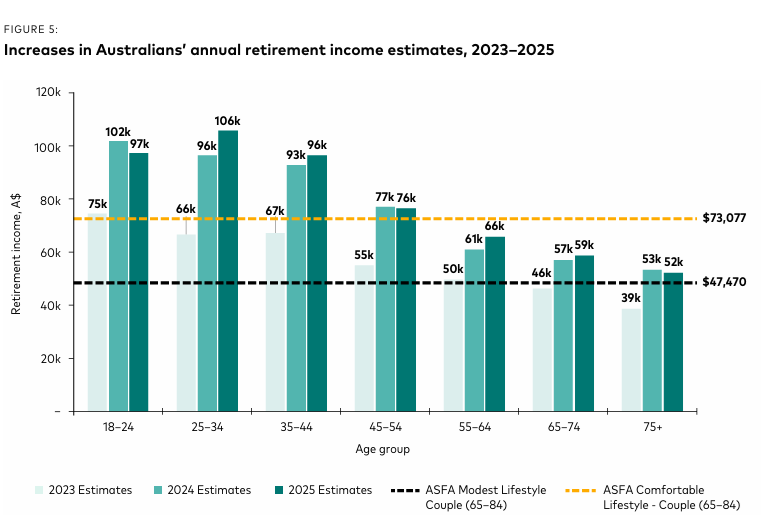
I agree with the younger cohort. In high-cost cities like Sydney or Brisbane, six figures in retirement income isn’t unrealistic if you don’t own a home. Housing costs and inflation have rewritten the rulebook on what “comfortable” really means.
If you missed it, my wire from last week breaks down the subjective meaning of a “comfortable” versus “modest” retirement.

2. Yet... Australians aren't confident about growth assets
While income expectations have surged, too many Australians lack confidence in growth assets - the very investments that will actually do the grunt work to fund their retirement.
Vanguard found that 57% of Australians feel most confident in cash and savings accounts… ironically, the asset class with the lowest returns.
Fewer than half expressed confidence in anything else, including super, the Age Pension, ETFs and, worryingly, even how a mortgage works.
"Only 35% of Australians were very or extremely confident in their understanding of superannuation products. Given the central role of superannuation in retirement planning, this is a concern," the report notes.
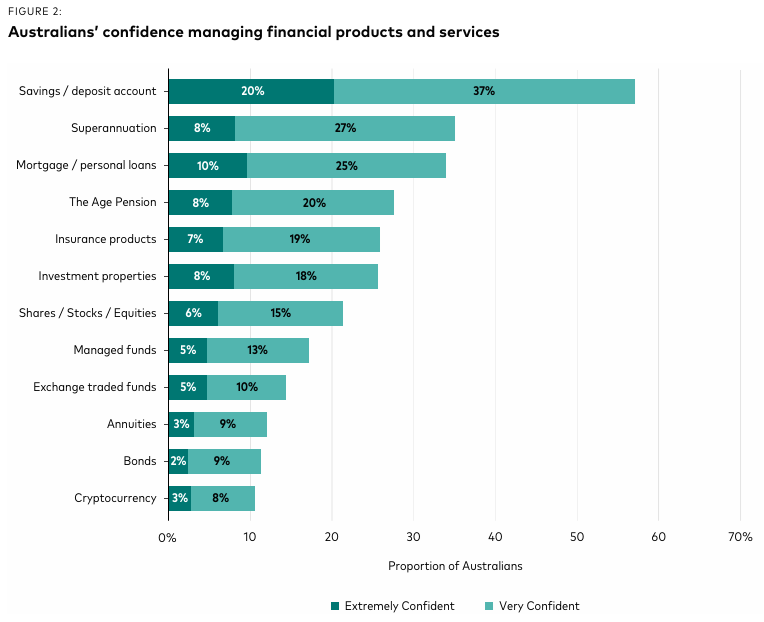
This is a wake-up call: Australians desperately need better financial education.
Parents should be teaching their kids about money and investing. And if you’re financially savvy, please share your knowledge with friends who need the help - whether it’s over a coffee, a lunch, or by pointing friends toward a good adviser. The cost of ignorance compounds even faster than interest.
3. The gap between ideal and realistic retirement ages
Every generation expects to retire later than their ideal age. For Gen Z, the gap is almost eight years; for Millennials, about seven. People want to be done by 60, but think they’ll work closer to 70.
“All age groups expect to retire later than their stated ideal age. This trend is consistent across generations, with younger Australians reporting a wider gap between their ideal and expected retirement ages. For Gen Z, the gap is nearly eight years; for Millennials, it is around seven years.”
Worse, those who have no plan expect to work until their 70s. It’s a stark reminder: the less you plan, the more likely you’ll be working long past your preferred exit.
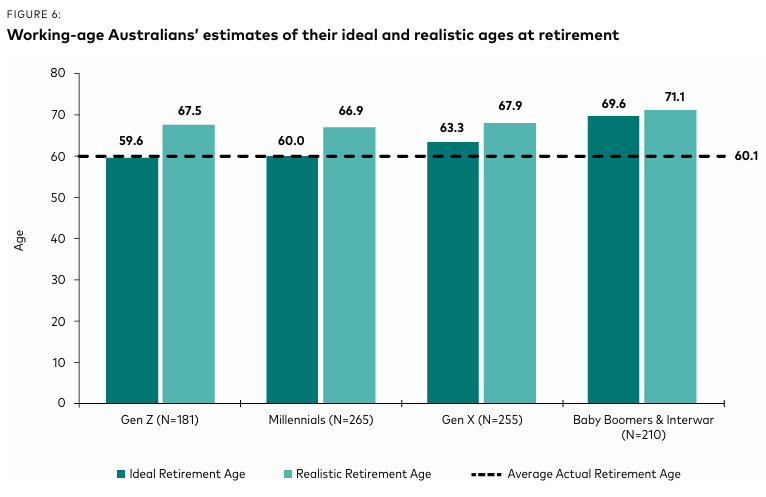
4. Home ownership no longer the dream... because it's unattainable

Rising prices and falling ownership rates mean younger Australians are starting to let go of the idea altogether, reshaping what retirement could look like. The contrast between generations could not be starker.
Among Boomers, 77% believe home ownership in retirement is very important. Among Gen Z? Just 57%. As Vanguard bluntly puts it:
“For many younger Australians, home ownership feels increasingly out of reach. This may explain why younger Australians rated home ownership in retirement as less important than older Australians."
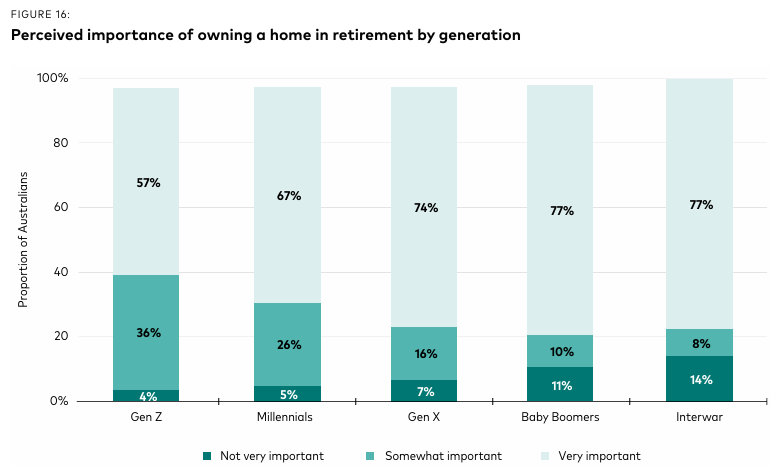
No doubt any adviser or parent would find this troubling, because renting into retirement brings its own challenges - from the constant risk of rising rents to the uncertainty of long-term stability with respect to living arrangements.
5. A mortgage-free retirement is no longer the norm
Yet for those lucky enough to own a home, retirement isn’t free of challenges. Over one-third of Millennials and one-quarter of Boomers expect to carry a mortgage into retirement - compared with just 8% of today’s retirees.
"More than one in three Millennials (36%) expect to have a mortgage when they retire, compared to 27% of Gen X and 24% of Baby Boomers," the report says.
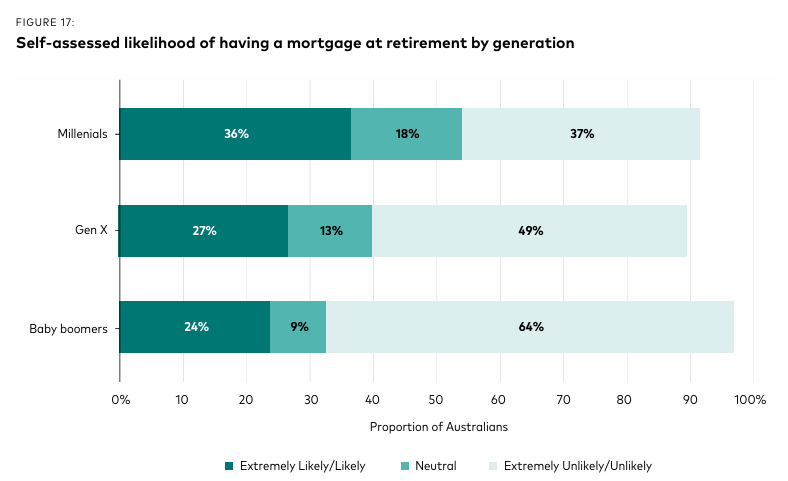
At first glance, it might seem puzzling that nearly a quarter of Boomers expect to retire with a mortgage despite decades of soaring house prices. But it’s precisely because of those gains that many have tapped their equity to help children into the market - often at the cost of retiring when they’d ideally like.
For younger Australians, the story is simpler: housing costs are so high that debt is unavoidable. Either way, mortgages are stretching deeper into old age.
6. How Australians plan to deal with mortgages in retirement
This was the chart that shocked me most.
Nearly half of working-age homeowners expect to carry their mortgage into retirement. Another 25% plan to raid their super to clear the debt, while 20% say they’ll sell the family home. Each path has trade-offs.
- Using super to pay off the mortgage means pulling liquid capital from your fund, which could reduce future income.
- Keeping the mortgage through retirement may mean working longer or juggling lifestyle needs against ongoing repayments.
- And downsizing? That raises the hardest question of all: where can you realistically move that’s cheaper without sacrificing your quality of life?
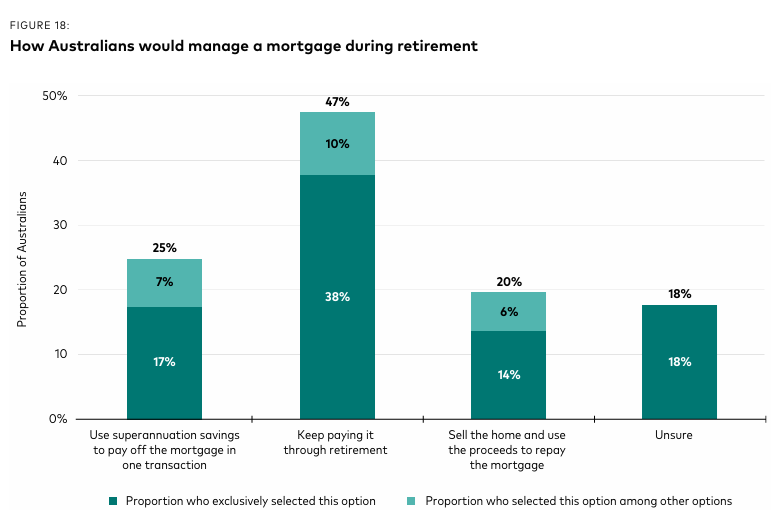.png)
As Vanguard notes: “Our research finds that few Australian retirees are planning to move to smaller or more affordable homes.”
From my own experience, that’s because it’s virtually impossible to find smaller, good-quality homes designed for retirees or folks getting older. We don’t talk about this enough, but it’s a key reason why many Boomers are holding onto large detached houses - not necessarily because they want to, but because they feel they have no other option.
It's quite the dilemma: young Australians can’t get onto the property ladder, while older Australians can’t get off it. An angle to an issue seldom discussed.
What it all means
There are three big takeaways from Vanguard’s report:
- Generational divide – Younger Australians expect to need more to retire, plan less, and face lower home ownership prospects.
- Financial literacy gap – Too many Australians don’t understand super, investing, or even mortgages.
- Housing debt drag – Mortgages and rent are increasingly following Australians into retirement.
It feels bleak, but it doesn’t have to be. Here are three actions to consider taking today:
- Reach out to an adviser. If parts of this report ring true for you - whether you own a home or are worried about how to strengthen your retirement plan - speaking to an adviser can give you clarity and direction.
- Take an interest in investing. We often debate between property vs shares, or active vs passive. The reality is doing something is better than nothing. Even simple, low-cost strategies like broad-market ETFs can make a dramatic difference to your wealth.
- Take control of your super. Don’t expect the government to roll out the red carpet for you in retirement. The current Age Pension is about $600 a week, and the median super balance is just $60,000. That doesn’t come close to six-figure income expectations. (See the video below on the changes I made to my own super that have made a huge difference.)
Retirement doesn’t have to be something we fear. But Vanguard’s message is clear: if you don’t plan for it, you’ll be working much longer than you want - and possibly still paying off a mortgage while you do.
Useful resources

Stay tuned for next week’s wire, where I’ll share how I - alongside industry experts - am building simple investing strategies using just a handful of ETFs while managing the abundance of growing choice.
DOWNLOAD VANGUARD'S REPORT
➡️ Vanguard How Australia Retires 2025 Report
2 topics

